Take steps to eradicate Aedes in 24 hours
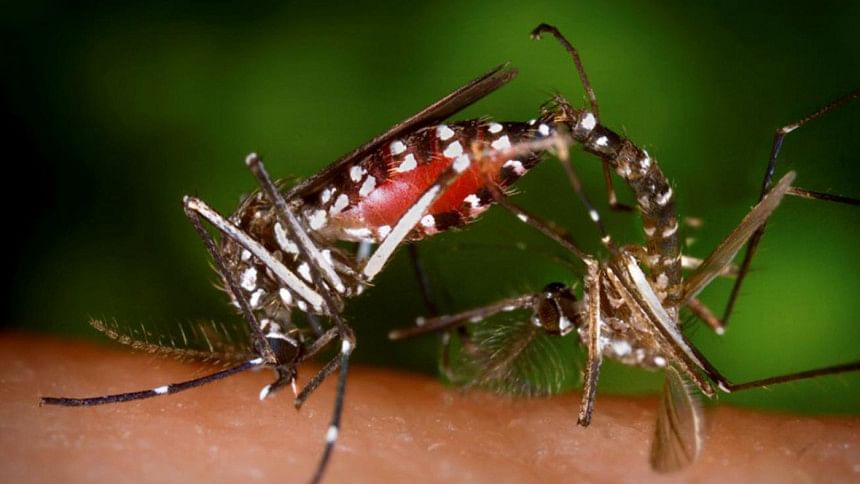
The High Court yesterday directed the authorities to take effective steps within 24 hours to eradicate Aedes mosquitoes from the capital.
It also ordered them to take preventive measures to stop the spread of dengue, chikungunya, and other similar diseases in the city.
Issuing a suo moto rule, the court also ordered the respondents to submit a report about the steps taken by them to prevent dengue and chikungunya and to destroy the breeding grounds of the Aedes mosquitoes by July 22.
Mayors of Dhaka north and south city corporations and their chief executive officers, secretaries to the ministries of health, and local government and rural development and cooperatives, and director general of Directorate General of Health Services have been made respondents to the rule.
In the rule, the HC asked the respondents to explain within four weeks as to why their inaction to eliminate Aedes mosquitoes and stop the spread of dengue, chikungunya and similar other diseases in the city should not be declared illegal and as to why actions should not be taken against the persons responsible for failing to take effective steps for preventing those diseases.
The bench of Justice Tariq ul Hakim and Justice Md Shohrowardi came up with the order and rule after the Prothom Alo, Janakantha, and Bhorer Pata published reports yesterday and the Prothom Alo also carried a report on July 13 on the issue.
According to the reports, hundreds of people in the city are suffering from dengue, chikungunya, and similar other diseases due to inaction of the authorities, especially the two city corporations, the court said in the order.
The court added that it had also been reported that over 11 people died recently from dengue fever.
Official sources and those at Dhaka Medical College Hospital have reportedly said more than 100 people are being hospitalised in the city every day with dengue and chikungunya fever. Unofficial sources report the number is higher, the HC said.
It added that unless something was done to stop those diseases, there would be an epidemic.
Assistant attorney generals -- Zaidy Hasan Khan and Saira Firoz -- were directed to communicate with the mayors of Dhaka north and south city corporations immediately in this regard.
According to a Directorate General of Health Services report, 152 people were infected with dengue virus in the last 24 hours, raising the infected people to 4,247 since January.
The number of deaths is three so far, says DGHS control room.
Experts said climate change effects, intermittent rain, weather pattern change and lack of cleanliness were the main reasons for this increase in dengue cases.
A survey by DGHS found high presence of Aedes mosquitoes in the capital.
The communicable diseases wing of the DGHS conducted the survey from March 3 to 12. It surveyed water samples collected from 998 houses at 100 places under 97 wards of two city corporations.
The survey found high level of larvae of Aedes mosquitoes in water collected in abandoned tyres, plastic drums, buckets, open tanks in under-construction buildings, and flower pots.
According to the survey, the density of mosquito larvae in water was high in wards -- 35, 1, 4, 19, 20, 16, 22, and 23 -- of Dhaka North City Corporation (DSCC) and wards -- 41, 12, 17, 4, 39, 6, 7, 14, 19, 20, 21, 22, 43, 47 and 48 -- of Dhaka South City Corporation (DNCC).
The DSCC is going to start mobile healthcare services for dengue infected people today, said a DSCC official.
He said 68 medical teams in 57 wards would provide this service from 476 centres.
DSCC Mayor Sayeed Khokon would inaugurate the programme at Nagar Bhaban today and it would continue until July 30.
DSCC Chief Health Officer Brig Gen Sharif Ahmed and his counterpart at DNCC Brig Gen Mominur Rahman Mamun at a meeting in health ministry last month said they were taking different steps, including building awareness among the people, and giving more emphasis on larviciding and adulticiding to keep dengue cases in check.

 For all latest news, follow The Daily Star's Google News channel.
For all latest news, follow The Daily Star's Google News channel. 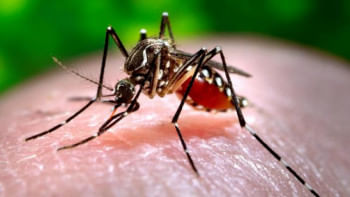


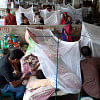
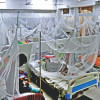
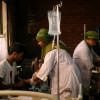
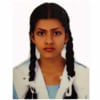



Comments